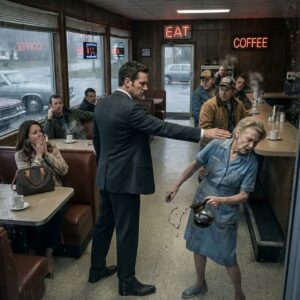It wasn’t a gradual realization; it was a sudden, sharp shock. My in-laws had gone into my daughter’s room and systematically disposed of every piece of clothing she loved because, in their eyes, the items looked «cheap.» They were embarrassing, they said. Her cousin had laughed at them. My daughter burst into tears, her heart breaking in that absolute, devastating way only a child’s heart can.
I didn’t cry. I didn’t scream. Instead, I did something far more permanent. And two weeks later, when they received a letter in the mail, the contents were so shocking they almost fainted.
I was in the middle of setting the table for dinner, placing the silverware just so, when my daughter, Nina, burst into the dining room. She was running as if the floorboards behind her were engulfed in flames.
«Mom,» she gasped, her voice cracking under the weight of her distress.
«They’re gone.»
I turned around slowly, a fork still in my hand. «What is gone, honey?»
«All my clothes.» Her breath hitched, a jagged sound in the quiet room. «My favorite ones. The yellow dress. The sweater with the little flowers on it. My jeans. Everything.»
She swallowed hard, tears pooling in her eyes. «It’s all gone.»
The room went silent. It wasn’t an innocent, confused silence. It was the heavy, suffocating silence that tells you everyone else in the room already knows a secret you are just discovering. My in-laws looked up from their plates, wearing the kind of self-satisfied smiles you usually only see on people who believe they have done something incredibly noble.
Sitting next to them, swinging her sparkly designer shoes beneath the table, was the girl who had been trained since birth to believe she was the center of the universe. My niece. The golden grandchild.
I wiped my hands deliberately on a dish towel and knelt beside my daughter, bringing myself down to her level.
«What do you mean, ‘everything’?» I asked quietly, keeping my voice steady.
«They cleaned my room,» she whispered, her lower lip trembling uncontrollably. «And now all the things I love are gone.»
Behind her, my mother-in-law, Sylvia, let out a long, theatrical sigh.
«Oh, sweetheart,» she cooed, her voice dripping with faux sympathy. «You really should thank us.»
My stomach dropped like a stone.
«We just did a little organizing,» she continued, picking up her wine glass. «Some of those clothes you kept were simply not appropriate for someone in this family.»
Someone in this family. There it was. The sentence she had been dying to say out loud for years.
My daughter wiped her wet face with the back of her hand. «Where is my yellow dress?»
My father-in-law, Charles, waved his hand dismissively, as if he were shooing away a bothersome fly. «Oh, that thing. It made you look poor.»
My daughter blinked hard, flinching as if the words had physically struck her.
Then the cousin, perfect little Vivian in her pristine designer dress, burst into loud, cruel laughter.
«Finally,» she said, looking at Nina with disdain. «Someone threw that trash out. She always looked so cheap.»
My daughter folded inward, her small shoulders curling forward as if she were trying to make herself disappear entirely. I didn’t move. Not yet.
«And,» my mother-in-law added cheerfully, stabbing a piece of steak, «if she wants her old things, she can go look for them where they belong.»
She pointed a manicured finger toward the back door. «The trash.»
Vivian clapped her hands in delight. «Oh my god, Grandma. Yes! She should totally wear trash. It suits her.»
The room seemed to tilt on its axis. My daughter made a small, wounded sound—half gasp, half sob. And that was it. She broke. It wasn’t loud, and it wasn’t dramatic. It was just silent tears rolling down her cheeks, flowing as if she was ashamed to even let them fall.
I put a hand on her back. My touch was steady, calm, grounding. But inside, something sharp and fundamental shifted within me. The bridge had been burned.
«Come on,» I told her softly. «Let’s go.»
I stood up, took her small hand in mine, and walked toward the door. I didn’t look at the people who called themselves our family. I didn’t look back when they murmured their fake sympathy. I didn’t stop when they called after me, acting confused by my reaction. I didn’t even pause when the cousin giggled, «Oops.»
Back in her room, Nina sobbed into my shirt, her body shaking.
«Maybe they’re right,» she whispered into the fabric. «Maybe I looked bad. Maybe I don’t fit here.»
I felt something cold and hard settle in my chest.
«No,» I said firmly, pulling back to look her in the eye. «You looked perfect. And you fit exactly where you belong. With me.»
She sniffed, trying to catch her breath. I brushed her hair back from her damp forehead.
«Do you want us to stay in this house?» I asked softly. «Or do you want us to leave?»
She didn’t hesitate for a second. «Leave.»
So we did. We packed with ruthless efficiency. We took whatever clothes they hadn’t touched, whatever belongings mattered to her, and whatever dignity we had left. Her father wasn’t home; he wasn’t even in the state. So it was just us.
We walked down the hallway with our bags, moving past the polished floors and the expensive antique furniture, walking past the people who had spent years reminding us that neither of us truly belonged there.
My mother-in-law was waiting in the foyer, her lips pulled into a tight smile that didn’t reach her cold eyes.
«Where will you go, darling?» she asked, her tone mocking. «You don’t have the money for this kind of drama.»
My father-in-law chuckled from the living room doorway. «Without us, you’re nothing.»
Vivian smirked from the stairs. «Bye, cheap girl.»
I didn’t answer. I didn’t say one single word. I simply opened the heavy front door, stepped out into the cool night air, and let it slam shut behind me. The air outside felt like freedom. They thought they knew who I was. They thought they knew what I had. They thought I was powerless.
They had absolutely no idea.
Two weeks later, they received a letter. And when they read it, they almost fainted.
When people ask how I ended up living with my in-laws in the first place, I always want to tell them the unvarnished truth: it happened one bad decision at a time. But really, it started long before that. It started with me, Natalie, the girl who grew up with massive dreams and a bank account so small it could have doubled as a rounding error.
I wasn’t raised in a bad family, just a perpetually tired one. My mom worked long hours in a clinic. My dad worked nights. Bills always arrived faster than the paychecks did, so I learned early on that if I wanted anything in this world—not even the big luxuries, just textbooks that didn’t smell like mildew—I had to get it myself.
I studied like my life depended on it. In many ways, maybe it did. I worked evenings, weekends, and every holiday shift that no one else wanted. I lived on stale coffee, cheap notebooks, and the kind of blind, ferocious determination you only possess when you are young and too stubborn to quit.
And somehow, after years of scraping pennies and skipping sleep, I got into a good university. Not a fancy, Ivy League one. Just a good one. But «good» was enough. Good meant possibility.
And then came the reality: the student loans. The endless jobs. The moment I realized that adulthood is basically sprinting with a backpack full of bricks while pretending you aren’t sweating. Still, I made it through. I graduated. I was exhausted, hopeful, and exactly one late fee away from a mental breakdown.
That’s when I got my first real job. At their company. My future in-laws’ empire. It was a business built generations ago, polished to look like old money, even though there were structural cracks under every marble tile.
And my future husband, Elliot, was my boss. Not in a sleazy, inappropriate way. He barely noticed me during the first few weeks. He was busy doing that rich kid thing where they pretend they hate being part of the family business but also don’t know how to survive outside of it.
But he was… kind. He was quiet and thoughtful in a way that didn’t match the rest of his loud, brash family. And I was ambitious, hungry, and tired of being broke. We were an unlikely pair, the kind of couple people whispered about by the water cooler.
And oh, did they whisper. The first time his mother, Sylvia, heard about me, she apparently told him, «You sleep with the secretary. You don’t marry her.» I wasn’t even his secretary, but accuracy was never really Sylvia’s strong suit.
When Elliot and I did start dating, the tension in the office became so thick that HR could have charged rent for walking through it. Eventually, it became too awkward and pointed to ignore. So, the company moved me to a different department. I wasn’t fired, just… shifted. Like a stain someone tries to rub out but can’t quite get rid of.
Still, Elliot didn’t care. We got married anyway, and that is when I made the worst decision of my adult life. I agreed to move into his parents’ house.
Look, I had reasons. Real, logical ones. We wanted to save money before buying our own place. I was trying to build a genuine family connection. I believed that if I was around them, they would warm up to me. I was adorable back then, in the way naive people always are.
Because from the moment I carried my suitcase across their threshold, I stopped being a person to them. I became an inconvenience. A daily reminder that their son had married «down.»
They commented on everything. My clothes? Cheap. My food? Strange. My background? «Well, she did come from nothing.» My voice? Too loud. Every single day was a new reminder that I wasn’t truly part of their family. Not really. Not in the way that counted to them.
And when Nina was born, things got significantly worse. She became the second-class child the moment she took her first breath. Because there was already a chosen one: Vivian.
Vivian was my sister-in-law Monique’s daughter. She had designer dresses, private dance lessons, and teeth so white they practically glowed in the dark. If Vivian wanted something, she got it immediately. If Nina wanted something, she was «spoiled» or asking for too much.
Vivian had a princess bedroom with a chandelier. Nina was given the old maid’s room—tiny, plain, tucked behind the laundry, with a single shelf that Sylvia had reluctantly approved. Vivian had birthday parties that looked like movie sets. Nina got a cake Sylvia selected, always with half the candles because «sugar is unhealthy.»
Everything was twisted. Everything.
And throughout all of this, I worked. Not in their company—because apparently, me being seen might embarrass the family name—but on a side project. A small idea I’d nursed through long nights and early mornings. A business. My business.
They called it my «little hobby.» Sylvia actually patted my head once and said, «It’s cute that you’re playing entrepreneur.»
But my little hobby started making real money. Not billionaire money, not mansion money, but real, steady, grown-up money. The kind of money you get when you build something that actually works, one exhausted day at a time. My business wasn’t huge or glamorous, but it was stable. It was healthy. It was growing.
I wasn’t rich in the way my in-laws worshipped wealth. But for the first time, I felt financially independent, not connected to their charity or their approval, and that mattered more than I can explain.
Meanwhile, their company, the proud old family empire, had been quietly sinking. Not that they knew. They never saw the late invoices or the empty operating accounts. Their CEO handled all the messy details. They walked through life assuming everything was fine because it always had been.
So when the CEO started calling Elliot with small problems—temporary cash gaps, delayed payments, payroll issues—my husband asked me to help. Just once. Then again. And again.
A temporary favor became a pattern. A pattern became a habit. A habit became the only thing keeping them from collapsing. I didn’t rescue them in one go; I simply kept them from crashing month after month. And still, they looked at me like I was one inconvenience away from falling apart.
When I drove away from that house with Nina in the backseat, she kept looking out the window, scanning the road behind us like she expected someone to chase us. No one did. Of course they didn’t. People like my in-laws don’t run after you. They wait for you to crawl back. And they were going to be waiting a very, very long time.
I took Nina somewhere neither of us had ever set foot before. A luxury hotel with a kids’ club, a spa, and the kind of front desk where they say your name like it’s a brand. Nina stared at the lobby chandelier like she’d discovered the lost city of gold.
«Are we allowed to be here?» she whispered, tugging on my hand.
It hit me like a physical punch. The in-laws had drilled that mindset into her so deeply that she didn’t even know she was allowed in nice places.
«Yes,» I said fiercely. «We belong here.»
Her shoulders loosened a little. Just a little, but it was enough. We spent the afternoon in soft robes, eating room-service pasta that cost more than my old weekly grocery budget. Nina kept whispering, «Is this real?» like she was afraid it would disappear. I didn’t have the heart to tell her that real life would be messier again soon, but for right now, she deserved this.
Elliot didn’t arrive until the evening. He’d been out of state on business. When he finally walked into our hotel room, he looked exhausted, confused, and already guilty.
«Natalie,» he said, dropping his bag. «What happened?»
I stared at him, at the man who somehow thought what happened could possibly fit into one simple sentence.
«What happened,» I said carefully, enunciating every word, «is that your parents threw away our daughter’s clothes.»
He blinked, freezing in place. «Why would they?»
«Because,» I said, «they decided she looked poor.» Even saying the word made me want to punch a wall.
He sat down heavily on the edge of the bed, running a hand through his hair. «My parents are…» He exhaled slowly. «They’re difficult.»
«Difficult?» I laughed once, a sharp, humorless sound. «They emotionally destroyed an eight-year-old because they didn’t like her outfits.»
He winced. «Look, Nat, I’m not defending them. I just… I know how they are. They don’t think before they…»
«I can’t live there anymore,» I said. I didn’t yell. I wasn’t dramatic. I was just final.
He looked at me, his eyes soft and pleading. «Okay,» he said. «If you want to move out, we’ll move out. We’ll get a place. I just… I don’t want a war.»
A war? It was cute that he thought we weren’t already in one.
We ate dinner quietly. Nina fell asleep in a mountain of hotel pillows, finally looking peaceful. When Elliot and I were alone, I opened my laptop. There was no sugarcoating it. It was time.
«I’m done supporting your parents’ company,» I said.
His head snapped up. «What do you mean?»
I turned the screen toward him. «They’re drowning, Elliot. They have been for years. Your CEO has been calling you for help so often I could practically set it to a calendar, and every time, you asked me to help, and I did.»
He looked like he’d swallowed a shard of glass. «I didn’t realize it was that much,» he whispered.
«Of course you didn’t,» I said. «Because they never tell you the truth. But this…» I tapped the screen. «This is the truth. Without the loans we’ve been giving them, they won’t last thirty days.»
He stared at the spreadsheet. Stunned. Silent.
«My parents,» he finally began, struggling for words.
«They’re your parents,» I said. «I know. And mine? They treated me like trash. Me? Disposable? Nina? Embarrassing. That’s who I’ve been helping. That’s who I’ve been keeping afloat.»
He scrubbed his face with both hands. «Let’s just… cool off,» he said. «Let’s not make big decisions tonight.»
I didn’t answer. Not because I didn’t have a decision, but because he wasn’t ready to hear it.
We tucked Nina into the big hotel bed. We turned off the lights in the suite. We sat on opposite ends of the couch, pretending to watch something neither of us actually saw. We listened to the hum of the air conditioner like it was counting down to something. The quiet felt heavy, like a verdict waiting to be delivered.
Then his phone buzzed on the table. He didn’t look at it. It buzzed again. And again. Relentless.
He flipped it face down, then pushed it farther away, but it wouldn’t stop. Ten minutes passed. Fifteen. Twenty.
Finally, he stood abruptly, grabbed the phone, and walked out onto the balcony.
«I’ll be right back,» he said, his voice tight.
He slid the balcony door shut, and I watched him through the glass. He lifted the phone to his ear and listened. Not just once. It was a long message. Then another. His shoulders tensed, his jaw locked. At one point, he pressed his hand to his forehead like the words were physically hitting him.
It felt like years before he moved. When he came back inside, he didn’t sit down. He didn’t speak. His face was… different. Not tired. Not conflicted. Not unsure. Something inside him had broken cleanly and decisively. He stood there for a moment, breathing hard.
«Let’s do it,» he said.
My heart kicked against my ribs. «Do what?» I whispered.
He swallowed. His voice was low, certain, almost dangerous. «Pull the plug.»
I blinked. I hadn’t expected that. «Elliot! What happened?»
He turned the phone around and handed it to me. It was a long series of voice messages from his family group chat. Messages they never meant for me to hear. His parents. His sister. Vivian’s laughter in the background.
They were talking about me. About how I had «married up.» How I should be grateful they ever tolerated me. How I was pathetic and using Elliot’s money. How Nina was weak, «just like her mother.» How they graciously «let us» live in their house. How they «allowed» Nina to attend their family school. How I was lucky to have access to real money at all.
And then the final blow? «She thinks she can leave? She’ll come crawling back. She’s nothing without us.»
Something inside Elliot had cracked clean in half. He handed me the phone as if it burned him.
«No more,» he said, his voice steady, his jaw clenched. «We’re done.»
So we sat down at the desk. We opened emails. We opened accounts. We opened every quiet little avenue through which we had been supporting them. And we closed them. One by one. We canceled financial extensions. We ended agreements. We refused new loans. We pulled the safety nets they had mistaken for entitlement.
We didn’t yell. We didn’t rant. We didn’t smear their names. We just… stopped. And the silence of that choice was louder than anything we could have said.
Elliot leaned back, exhaling like he’d finally surfaced after years underwater.
«I should have stood up sooner,» he said quietly.
I put a hand over his. «You’re standing now.»
He nodded, his eyes dark. «They’re going to lose it,» he said.
«Oh,» I replied. «I’m counting on it.»
But we had no idea. No idea how fast the fallout would hit. No idea how ugly they would get. No idea what they were prepared to do next. All we knew was this: We’d lit the match, and the fire was coming.
It’s funny how silence can feel like a threat. For months, that’s all we got from Sylvia and Charles. Silence so heavy it felt like it had a pulse. Not a single call to ask where Nina was. Not a text to check whether we were still alive. Not a message to Elliot saying they missed us. Just… nothing.
Which would have been peaceful if I didn’t know them so well. Silence from people like them isn’t peace. It’s plotting.
And right around the time I started to think they’d maybe crawled into a hole made of their own bitterness, Elliot got a call. Not from his parents. But from Mr. Kessler, a man who had been their family friend, lawyer, and unofficial emotional janitor for at least two generations.
He never called us. That alone set my alarm bells off.
Elliot put the phone on speaker, and the man’s voice boomed through the kitchen like he was announcing a funeral. «Elliot, Natalie, we need to talk.»
I looked up from the sink. Elliot mouthed, Told you.
«What about?» Elliot asked.
A long sigh came from the other end. «I’m hoping we can meet today,» Mr. Kessler said. «In person.»
In person means bad. A lawyer in person means catastrophic. Nina was coloring at the table, humming softly to herself—a sound that still made my heart ache because it used to be so rare.
«Can you tell us what’s going on?» Elliot pressed.
Another long pause. «It’s your parents,» Mr. Kessler said. «You should hear this from me, not from outside sources.»
Outside sources? What were they? A political scandal?
«Can we talk at your place?» he added. «I’d prefer that.»
Elliot hung up and looked at me. «They’re in trouble,» I said.
He nodded. «Big trouble.»
By the time Mr. Kessler arrived, clipboard in hand and sweat on his forehead, he looked ten years older. He sat down, tugged at his collar like it was trying to strangle him, and said, «They’re going to lose the company.»
Elliot inhaled sharply. I stayed quiet.
«The debts, the unpaid invoices, the outstanding loans,» Mr. Kessler’s voice shook. «The CEO has been doing everything he can, but without the financial support…» He stopped, shifted uncomfortably, then glanced at me. «The financial support you were providing, they simply can’t cover basic operating expenses.»
Nina looked up from her coloring book. «Operating what?»
«Bills,» I said gently.
«Meaning,» Mr. Kessler continued, «payroll, suppliers, the electric bill, their fancy office with the espresso machine. Within the next few weeks, they will be forced to declare bankruptcy. And because of the structure of the company, it’s possible they’ll lose personal assets as well.»
He looked at Elliot. «I don’t believe your parents fully understand that.»
Of course they didn’t. They never understood anything unless it sparkled.
«I’m here,» Mr. Kessler said, «because they asked me to speak on their behalf.»
Of course they did. «What do they want?» I asked.
«To restore your arrangement,» he said.
I raised a brow. «My arrangement?»
He winced. «Your financial support.»
Ah. So that’s what the sweet tone was for. They didn’t disappear out of heartbreak. They disappeared because they needed time to rehearse their performance.
Elliot folded his arms. «They treated my wife and daughter horribly,» he said. «Why would we help them?»
Mr. Kessler closed his eyes briefly, like the headache was spreading. «Because this company has been in your family for generations,» he said. «It was built by your great-grandfather. Your parents believe it would be a tragedy to see it end.»
«Then they should have treated it better,» I said.
His eyes flicked to me, surprised, then resigned. «I understand,» he said quietly. «Truly. But I’m asking you to consider them as family.»
I almost laughed. Elliot answered first.
«She is my family,» he said, pointing to me. «And Nina is my family. The rest? I’m not sure anymore.»
Mr. Kessler sighed the sigh of a man who knows he’s lost before the battle even starts. «They will never ask you directly,» he said. «They are too proud. They sent me instead.»
He stood up. «I’ve delivered the message. The decision is yours.»
We showed him to the door, and by the look on his face, he already knew the answer.
A few days passed. They were rainy, gray, nothing-special days. Until it happened. A loud, enthusiastic knock on our front door. The kind of knock people use when they want to seem friendly instead of desperate.
Elliot and I exchanged a look. «Brace yourself,» he murmured.
He opened the door. And there they were. Sylvia, smiling like she’d never insulted anyone in her life. Charles, puffing his chest out like a wounded rooster. Monique, wearing a scarf worth more than my car. And Vivian, dressed like she was attending a fashion show for spoiled eight-year-olds.
And they had a cake. A homemade cake. If anything deserves a horror soundtrack, it’s in-laws holding baked goods.
«Natalie, dear!» Sylvia gushed. «We just had to come see you.»
I almost asked her if someone had dared her at gunpoint.
«We’ve missed you,» she continued. «Oh, and our sweet Nina. We miss her so much.»
They poured into our living room like a well-dressed tsunami. Monique did the fake tear voice. «We were all just talking about how important family is.»
Vivian stood in the middle of the room and announced, «I’m sorry,» then added without blinking, «Mommy told me I had to say that.»
A beautiful apology, straight from the heart. Sylvia nodded approvingly, like she’d just orchestrated world peace.
«And we would love,» she said sweetly, «for us all to start fresh.»
Monique clasped her hands together. «Put the past behind us.»
Charles smiled thinly. «We’re willing to move on.»
Elliot didn’t even pretend to smile back.
«So,» Sylvia said lightly, testing the waters, «do you think you’ll be able to… continue helping the company?»
There it was. The real reason they came. Not for Nina, not for Elliot, and definitely not for me.
Elliot said, «We need a moment to discuss it.»
We stepped outside onto the porch. The moment the door closed, we looked at each other and said the exact same thing at the exact same time.
«No.»
It wasn’t even a question. We walked back inside. Elliot spoke first.
«No,» he said.
The shift on their faces was instant. Sugar turned to salt. Honey turned to venom. Politeness collapsed into betrayal.
Sylvia’s smile cracked. «What?» she snapped. «Do you mean no?»
Monique’s voice sharpened. «We apologized!»
«You owe us!» Charles shouted. «We humiliated ourselves for you!»
«And you’re still refusing to act like family?» Sylvia hissed.
Elliot stepped between them and me. «You treated my wife like garbage,» he said. «You treated my daughter like she didn’t belong in your home. You never meant any apology you gave. This was all about money.»
They stared at him as if he’d stabbed them.
«We’ll disinherit you,» Charles spat.
Elliot actually laughed. «Disinherit what?» he said. «Your debt?»
Silence. The kind that told me they realized we knew everything.
«We’re done,» Elliot said. «Please leave.»
They left in a storm of expensive perfume and collapsing pride. And though the house went quiet afterward, it wasn’t peaceful. It was the quiet before impact. Because what we’d done wasn’t just cutting ties. It was removing the last thread holding their world together. And when that thread snapped, everything would fall.
Six months later, their world finally collapsed.
Sylvia and Charles declared bankruptcy. It was the kind that doesn’t just take your business; it shakes the bones of your identity. They had to sell the second house, the lake cabin, and the antique furniture Sylvia used to brag about. And because of the debts they’d piled up, the court forced them to repay what they could—including the money they’d borrowed from me.
Sylvia cried when she handed over the check. Not because she was sorry. But because it hurt to lose.
Vivian now goes to public school. Last I heard, she hates it. Apparently, no one there cares who her grandparents are. Or were.
Monique works part-time at a candle store. A far cry from her socialite era, but she tells people she’s «finding herself.» Sure.
And Charles? He’s a junior manager at a logistics firm. A junior manager. The man who once told me I was lucky to be in his home now reports to someone half his age. He ruined his company, so, honestly, it’s surprising anyone hired him at all.
As for us? Elliot and I are just living our quiet, peaceful, thriving life now. Our business is booming. Nina laughs more these days. She sleeps better. She dresses exactly the way she wants. We’ve been «no contact» with Sylvia and Charles since that day.





